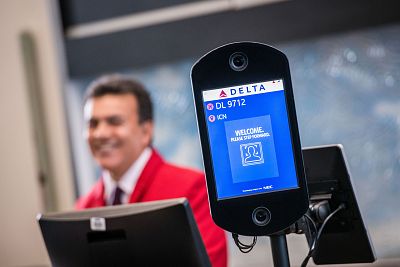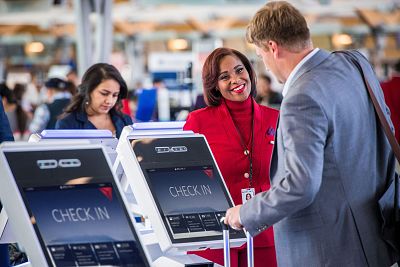The same technology that promises greater convenience for airline passengers raises privacy concerns.
Traveling abroad? Get ready to smile for the camera.
U.S. Customs and Border Protection is rolling out facial-recognition systems at the nation's 20 top airports. The systems are designed to verify the identities of passengers entering and exiting the country by measuring unique facial "landmarks," such as the distance between the eyes or from forehead to chin, and cross-checking that data with passport photos already on file.
The biometric systems are already in use at some airports, and they could be in place everywhere as early as October 2020. They're similar to the biometric systems that some airlines have begun using to simplify and speed up the departure process.
Delta implemented a "curb-to-gate" facial recognition system for international travelers at Hartsfield-Jackson Atlanta International Airport in December, and the airline says it will bring the program to Detroit Metropolitan Airport this year. Other airlines, including JetBlue, British Airways and Lufthansa, are running biometric pilot programs of their own.
"I think what will happen is that you'll see a gradual adoption of these sorts of technologies by bigger airports over the next three to five years," said Sean Farrell, director of self-service for SITA, a Swiss firm that last year implemented the facial-recognition system at Orlando International Airport in Florida.
"It's going to grow fast," Ahmed Abdelghany, a professor of operations management at Embry-Riddle Aeronautical University in Daytona Beach, Florida, said of biometric screening. "The incentives are there for the airlines."
Those incentives include reduced staffing and shorter boarding times — which, of course, is a boon not just for airlines but also for travelers who like the idea of checking in and boarding flights without having to show a boarding pass or ID.
British Airways said its system made it possible to board 400 passengers in just 22 minutes — less than half the usual time. And Delta said its facial-recognition system in Atlanta cuts boarding times for wide-body jets by nine minutes.
Darren Murph, a strategist for travel website The Points Guy, reviewed Delta's curb-to-gate program when it debuted last year — and gave it high marks. "Though the process was new, everything operated smoothly, and it certainly made the entire experience far more frictionless," he said.
A mixed bag on privacy concerns
If the increased efficiency of biometric screening offers clear benefits and has Murph applauding, privacy advocates worry that the systems constitute an invasion of privacy.
"It's another step toward creating a comprehensive tracking system," said Jay Stanley, a policy analyst with the American Civil Liberties Union in Washington. "That's our ultimate fear, that we turn into a society where we are tracked in that way."
Science
What does the broader public think about facial recognition? In a 2018 poll of 2,000 adult Internet users, 44 percent of respondents viewed such systems unfavorably, as opposed to 27 percent who viewed them favorably. But another 2018 poll of more than 3,000 adults found that roughly 45 percent of respondents didn't think the government should limit the use of biometric technology, as opposed to 26 percent who did.
Air travelers who have used some form of a biometric system to enter and exit a country worldwide gave it a satisfaction rating of 8.36 out of 10, according to a report issued in February 2019 by SITA and the industry publication Air Transport World.
Few passengers seem to object to Delta's biometric screening system in Atlanta: Of the nearly 25,000 customers who travel through the international terminal each week, Delta says less than 2 percent opt out of facial scans — choosing to rely on regular passports and boarding passes instead.
With the computer algorithms used for biometric security systems getting more and more accurate, Abdelghany said convenience would ultimately trump any privacy concerns. "In the end, whatever technology makes your life easy wins," he said.
Biometrics for domestic flights
The Transportation Security Administration says it would like biometric boarding to be offered for domestic as well as international travelers. But that could take a while, since domestic travelers typically use a driver's license for identification. While passport details are stored in a single federal database, each state maintains its own database of driver's license information — complicating the process of accessing the data.
Farrell said the expansion of facial recognition for domestic travel might start with passengers who have passports or who have enrolled in the TSA PreCheck program, which gives passengers access to expedited security screening for an $85 fee every five years. PreCheck passengers are required to have their pictures taken as part of the application process.
For travelers who don't want to wait for the arrival of airline-offered biometric boarding, third-party options are available for some aspects of the air travel experience.
The New York-based firm Clear lets travelers breeze through security at 27 airports using fingerprints and facial recognition — providing they're willing to pay $15 a month for the convenience. Clear has also partnered with Delta to grant passengers access to airport lounges using fingerprint scans.
Biometrics is also coming to other aspects of air travel. This year, rental car giant Hertz is rolling out facial recognition and fingerprint screening at 40 airports. Hertz says the technology will allow customers to grab a car and exit the rental lot in just 30 seconds.
Want more stories about technology?
- Future-cities visionary sees urban areas becoming smarter, more responsive
- Mood-forecasting tech could help stop bad moods before they strike
- 'Digital smell' could transform the way we communicate
SIGN UP FOR THE MACH NEWSLETTER TO GET THE LATEST SCIENCE AND TECH NEWS. FOLLOW MACH ON TWITTER, FACEBOOK, AND INSTAGRAM.













